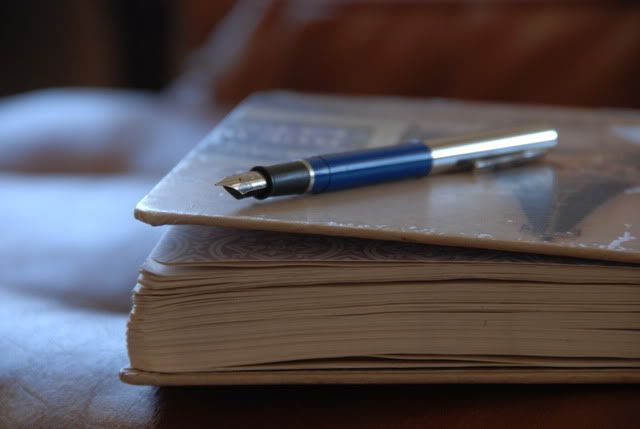
Over the next few Mondays, I will be posting about journaling, which is beneficial to my column writing work and keeping my life organized. Journaling or free writing to a writer is like practicing or warming up before an event to a roper. Journaling is mainly for dumping my thoughts and recordkeeping but also primes my mind for ideas that I can potentially turn into a column.
Farmers and ranchers especially, can benefit from keeping a journal in the form of a large wall calendar, pocket notebook, calf recordbook/calendar, or business style diary. Journaling can organize a person’s life and be a valuable record of past ranching or farming practices.
My husband has experienced the value of recording things in his pocket-sized calendar/calf record book and keeps it with him at all times. To keep things straight in his head, he jots down what he’s done each day in the weekly calendar part of his calf record book.

He records everything we do on our ranch like how much salt we bought or took out to a pasture, each year’s hay production on every hay field, when he replaced an equipment part and the part number, important reminders, when he bought or sold a bull or cows, when he talked to someone and their contact number, when we moved cows, you get the idea.
It’s been helpful to refer to whenever he can’t remember amounts, payments, appointments, people, phone numbers, to-dos, or got-dones. It has proven to be very valuable, especially at tax time.
I laugh because he only writes down key words or makes-up abbreviations and sometimes has trouble recalling what his abbreviation meant. He holds the record for the most abbreviated entries and I am amazed at how much he can fit in the little lined squares for each day.
His calf/record book has become such a valuable item to him that he went ballistic at the thought of his record book going through the wash when he couldn’t find it one time. Fortunately, it was safe but his initial reaction freaked me out.
There’s a misconception among non-journalers that keeping a journal is for girls, has to be written in everyday, takes work to keep up, or that he or she isn’t a writer and never knows what to write. Journaling can benefit anyone and doesn’t have to be drudgery, take a lot of effort, or require a lot of words.
The main journal I keep I write in when I feel like it and usually write whatever is on my mind: goals I want to keep track of, kids, worries, accomplishments, gratitudes, humorous or special events in my life or my kids’ life, details about occasions I don’t want to forget, venting, ranching problems or to-dos, the topics are endless.
Journaling doesn’t have to be lengthy, eloquent, complicated and most importantly: grammatically correct. Lewis and Clark’s journals are proof of this. Journals are forgiving. It’s the one place you can make mistakes freely. And trust me, my pages are filled with them.
I’ve read books on women who recorded their journey west and many of their entries had frequently misspelled words and fragmented sentences but read like their daily thoughts, which they probably considered mundane but I found fascinating to read.
The existence of journals have been bluffing and intimidating people for years. The most important thing to remember about journaling is that the contents of a journal are just words words that are someone’s thought process but they can also turn into a person’s legacy.
When I write, I regularly use my own made up abbreviations and don’t worry about sentence structure, grammar and mechanics. For example, in my journals, I use @ to mean at, about, or around.
A great way to keep a journal is to carry a small to medium-sized hardcover notebook (spiral bound is good) and use it like a portable scratch pad, where all notes, reminders, thoughts, ideas, appointments, contact numbers are in one place. Here’s the one I carry in my purse.
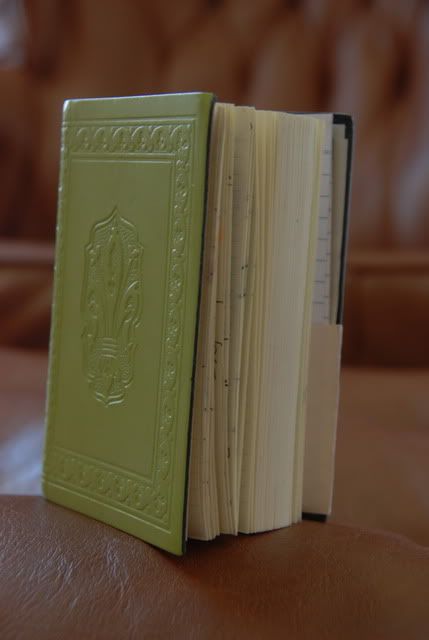
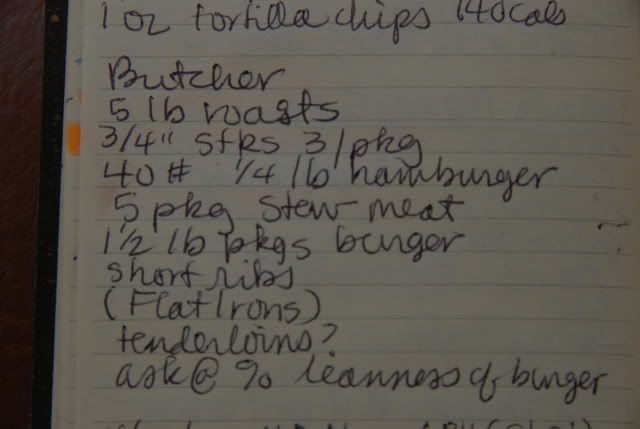
I bought it at a second hand store because it was only $1.25 and was lined. It just happened to be lime green but the cover also happened to be Italian Leather. It’s a dumping spot for all those jotted-down notes on scraps of paper that used to end up here or lost.
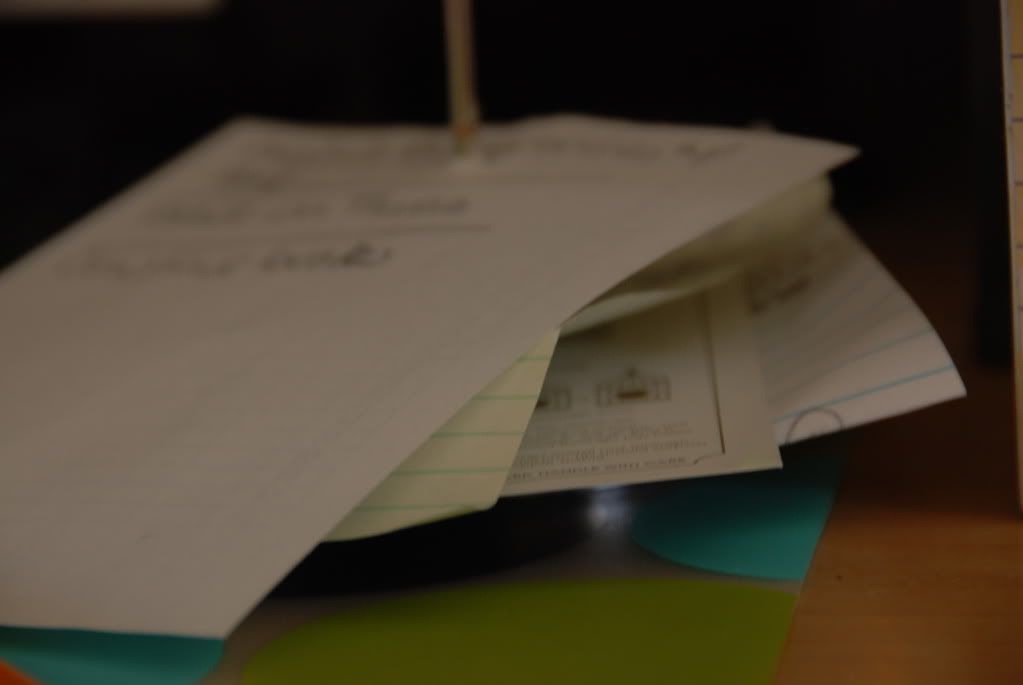
Another suggestion is to buy a pocket size weekly calendar with lines for each day and to jot down using keywords or acronyms, what you did that day. I bought this one at a dollar store.
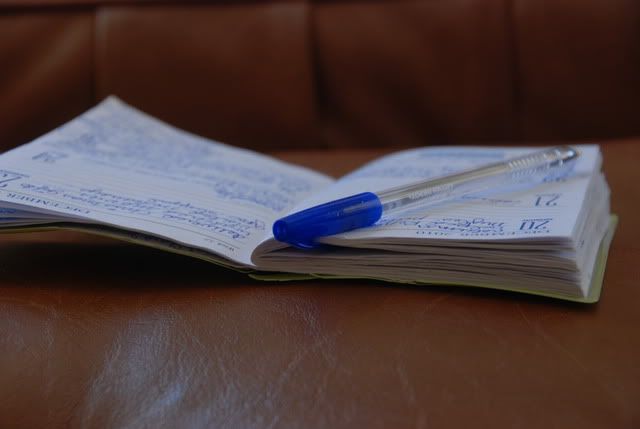
You’d be amazed at how handy it becomes.
If I don’t have a lot of time, I’ve discovered a new technique for summarizing my day, a trip, or my thoughts. I make lists of details.
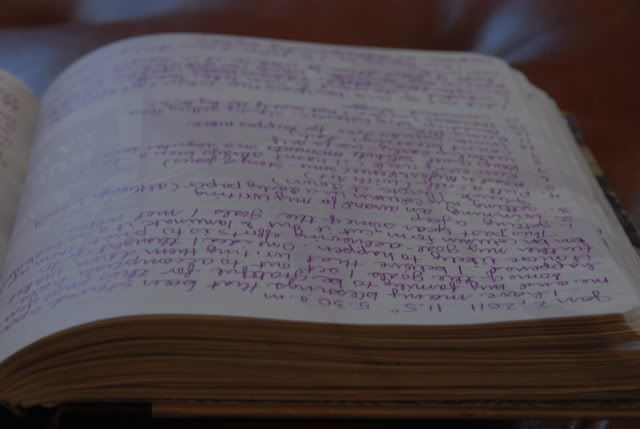
A list of things I can recall about a recent trip, event, season, or place. My favorite lists are of specific details for special holidays with my family.
Other list ideas could be:
- Impossible goals/dreams
- Books you’ve read or recommended reads
- Accomplishments you’ve made big or small
- All the cars or tractors you’ve owned
- Things you got done that day, week, or month
- Places you’ve been
- Jobs you’ve had
- Plants in your garden
- Favorite Family Recipes
Write little side notes of thoughts that come into your mind. Eventually, these lists will jump start a thought that could lead to a journal entry you could write about. Or not. It’s your journal to record whatever you want.
Next Monday I’ll talk about why keeping a journal should be a part of your life.
2 responses to “Journaling Part I”
Just wanted to let you know that you have inspired me – I have set up a blog of my own – ranchdaze.worpress.com
Hope you enjoy it.
[…] I mentioned in a previous post, I also have a regular journal for writing my thoughts, and a pocket size journal I use like […]